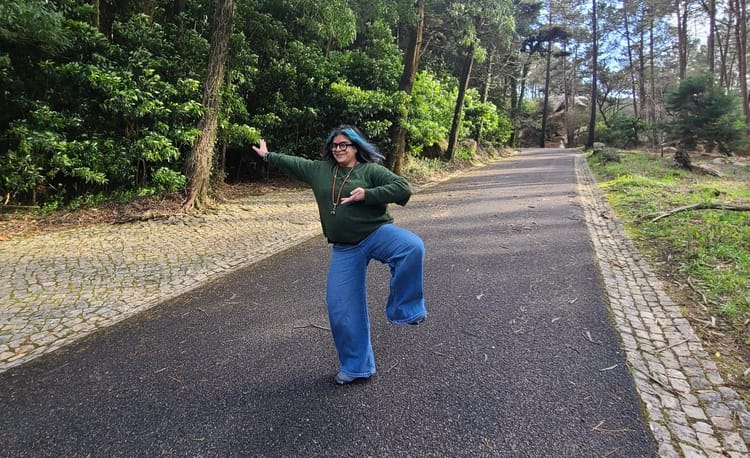The Happiness Quotient

Sid, our pup Macha and I have been spending our mornings together. We begin with cuddling the pupper, and going for a long walk that ends in the dog park. We come home, make our respective morning juice, mine chai, his coffee, and settle on our little deck. Macha sits in the sun, taking in the D.
This has been the highlight of my life for the last few weeks. During writing practice, my co-conspirator Aliya offered a writing prompt: If you could have one memory for the rest of your life, which one would it be? I wrote about one such morning with Sid and Macha. I wanted to remember the love and the overwhelming peace and joy I felt. I had remarked to Sid at how bowled over by contentment I was at that moment. If you know me, you know that I do not take memories lightly - I live at risk for Young Onset Dementia. I ended my piece with the line, “I cannot believe it is not a memory of Mom.” Sid argued with me that I had written about that moment with him because it had just happened. He was incredulous that I had not chosen a day with my mom at Sundarvan, a local nature park in Ahmedabad where I grew up. I was offended, but I was not able to articulate that day why these memories are so important. I was sad that we had argued. I was perplexed that the love of my life would challenge me ever for something subjective and personal.
Cut to a few days later, we were having one more of these pure essence moments, and I asked Sid, “On a scale of 0-10, how happy are you with your life?” He said 8. His reasoning was that he had a lot in his life to be grateful for, and there was scope for improvement. I was irked. Sid is the sort to rate everything lower because “nothing is perfect,” but he clarified. He said, “I would like to make time for sport and get better at praying daily. These are things I enjoy a lot and I wish I did them more often.” That made sense. It wasn’t a frivolous answer.
The Dharma has taught me that I can hold many truths and experiences at the same time. I can be suffering and experience immense peace amidst that.
When it was my turn to respond, I said, “My life is at a 10.” He pushed back. He reminded me that I had significant health challenges and recently he had seen me struggle a lot. Unlike the last discussion, I felt complete ease when responding to this. I said, “Yes, I have significant challenges, but happiness does not mean the absence of suffering. Suffering is inevitable. Before, I did not have the tools to cope with what life brought forth, and my suffering was often doubled because I acted in ways that made my situation worse. But now I have the tools to cope and even thrive. The Dharma has taught me that I can hold many truths and experiences at the same time. I can be suffering and experience immense peace amidst that. My perspective is one of optimism instead of being all doom and gloom. For me, this alone is a 10.”
I meant what I had said. I don’t think there’s just one #10 or that it is in the distant future. There can be many #10s; my life is full of 10 on 10 moments. They come when I slow down and linger in these little moments and allow them to wash me over. They co-exist with the imperfections of my mind, body, and society and they help me transcend them.


Member discussion